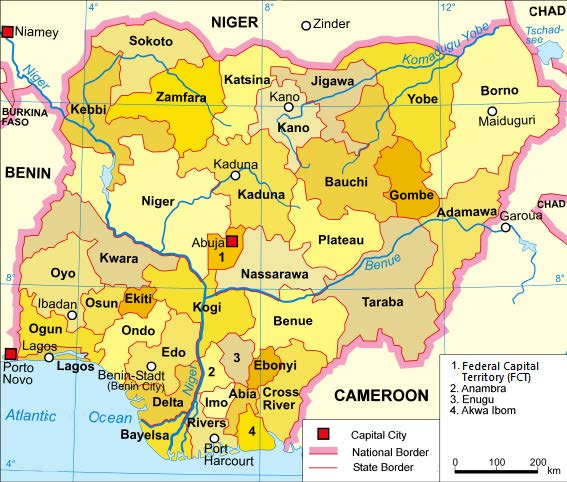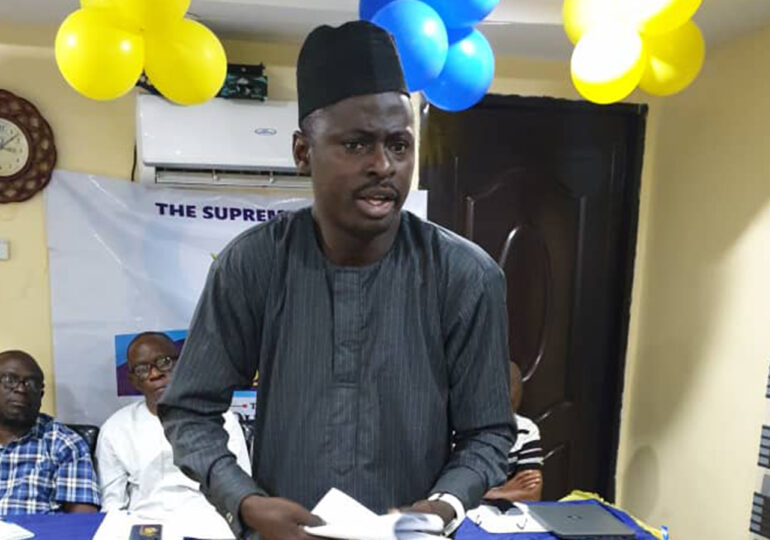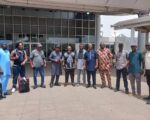Nigeria is confronted with multiplicity of security Challenges. Scholarship and opinions on systemic failure and overburdened security architecture abound. Contextual analysis pari passu developmental challenges of these state of insecurity, remain an uncharted course. Arguably, the State’s model to effective quelling of security threats are perceived to be biased and unpopular, thereby presenting a loss of confidence in the conflict handling style of the government. Suffice to say that the matrix is detrimental to the socio-economic development of the country. This paper highlights and aligns the peace, security, economy and development matrix and suggests a sustainable security model for human and national security focus in Nigeria. To underpin the discourse, Durkheim’s structural/functional theory was used as a framework of analysis and the qualitative research was adopted. While utilizing a desk review of secondary data, the paper posits that the role of the citizens in intelligence gathering and reporting cannot be overemphasized. In addition, the gathering, reporting and utilisation of intelligence has been hampered by trust deficit. The paper recommends strategic ways to build trust and address the insecurity imbroglio for sustainable socioeconomic development.

Security is a fragile and significant issue which conveys different meanings to scholars, analysts, policy makers and organisations across the globe. Fundamentally, security has to do with the presence of peace, safety, gladness and the protection of human and physical resources or absence of crisis or threats to human dignity, all of which facilitates development and progress of any human society (Afolabi, 2015). In their work, Omoyibo and Akpomera (2013) saw security as a concept that is prior to the state, and believe that the state exists in order to provide that concept. In an earlier work by Thomas Hobbes in 1996, Security is posited to be the primary responsibility of the state. Both concepts are thus mutually exclusive to each other.
Security has to do with the process connected with assuaging any kind of threat to people and their values. Security, as stated by Afolabi (2015), can be on three major levels: individual, national and international level. At the national and international level, conventional security implies the safety of life and properties as well as maintenance of law and order, which entails a peaceful and developed society. At the individual level, security is seen from the dimension of the people. The human-centric security is referred to as human security. There are seven dimensions of human security which includes economic security, food security, health security, environmental security, personal security, community security and political security. The human security paradigm shifts the focus from the conventional state centred security to a people centred security in such a way as to view insecurity from the effects it has on the populace either directly or, indirectly.
The alarming level of insecurity in Nigeria has fuelled the crime rate and terrorists’ attacks in different parts of the country, leaving unpalatable consequences for the nation’s economy and its growth. Despite the plethora of security measures undertaken by the government and other stakeholders to address the daunting challenges of insecurity in Nigeria, these efforts have not produced the desired result. Against this background, this paper therefore seeks to examine the state of security, economy, peace and development in Nigeria.

Figure 1: Map of Nigeria showing the 36 states and FCT
Source: Hoopla (2018)
The paper adopts a functional-structural model of explanation as a base for discussion. Structural-functionalism theory sees society as a structure with interrelated pasts designed to meet the biological and social needs of the individuals in that society. It grew out of the writings of English philosopher and biologist, Herbert Spencer (1820-1903), he argued that just as the various organs of the body work together to keep the body functioning, the various parts of society work together to keep society functioning (Spencer 1898). Manifest functions are the sequences of a social process that are sought or anticipated, while latent functions are the unsought consequences of a social process. A manifest function of college education, for example, includes gaining knowledge, preparing for a career, and finding a good job that utilizes that education. Latent functions of college years include meeting new people, participating in extracurricular activities, or even finding a spouse or partner. Another latent function of education is creating a hierarchy of employment based on the level of education attained. Latent functions can be beneficial, neutral, or harmful. Social processes that have undesirable consequences for the operation of society are called dysfunctions. In education, examples of dysfunction include getting bad grades, truancy, dropping out, not graduating, and not finding suitable employment (Structural Functional Theory, 2021). Émile Durkheim, another early sociologist, applied Spencer’s theory to explain how societies change and survive over time. Durkheim believed that society is a complex system of interrelated and interdependent parts that work together to maintain stability (Durkheim 1893), and that society is held together by shared values, languages, and symbols.
Applying the above analogy to our present discuss, the following issues are established
1. Structures affects the functions of a society; in other words, the functional activities of a society are largely as a result of its structural make-up.
2. Also, that interrelated organs of the society affect the functions of the society and, a dysfunction in one part affects the remaining parts. Just as socio-cultural composition, political institution, economic structure as well a peace and security are all interrelated organs of the society, and a dysfunction in one can affect the smooth running of the whole social system.
3. A manifest function of a society is to have a secured, peaceful and developed socio-economic and political life. And a situation where human security of the people is guaranteed efficiently. Thus, a dysfunction occurs when this function is not performed and this is largely influenced by the structure of the society. An apparent lapse in the function reflects the dysfunction in the system.
The State of security in Nigeria

Figure 2: Map of Nigeria showing the Geo-Political Zones
Source: Leviavery (2020)
Security according to Igbuzor (2011), is defined as “the condition or feeling of safety from harm or danger, the defence, protection and preservation of core values and the absence of threats to those values” (Igbuzor, 2011). National Security does not have to do with military defence alone. The concept of national security must be located where it rightly belongs by attaching to it a broader meaning that emphasises not only development in the military or defence sense but, political, economic and social development of the society. Development is thus a central concept in our understanding of National Security. There is in fact, a dialectical relationship between the concept of development (which depicts both quantitative and qualitative improvement in the conditions of existence of a nation and its nationals) and national security. This includes improvement in political, economic and social conditions (Mou, 2016).
The issue of security has taken centre stage in Nigeria, giving the major security challenges prevalent in many areas of the country. Kelechi and Chijioke (2016) asserts that events in the country highlights how ‘a number of major military and non-military forces of insecurity are weakening the process of national development in the country’ (Ani and Onyebukwa, 2016). Some of the common security situations reflecting the state of security in Nigeria includes Terrorism. An example of this is the Boko Haram terrorist activities and the group has her activities centred within the Nigerian state and her neighbour. The activities of this group in Nigeria have been proven through extensive research to have negatively affected the wind of national development (Ani and Onyebukwa, 2016)
Today, the ever-present challenges the country faces include the scourge of the Boko haram terrorist group, Farmers-Herders conflict, crisis of ungoverned spaces: Banditry and Kidnapping, increased displacement of people and, the new threats posed by Eastern Security Network (ESN). These challenges have not taken into account the increasing cries for secession by some groups and the threat posed by refugee inflow to the country, especially from Cameroon. The introduction of new players in the northeast has further complicated the insecurity in the country. The Boko-Haram group metamorphosed at a point to Islamic State of West Africa (ISWAP). Furthermore, the group had a break-away faction named AnSaru-Rusi. The factions have been carrying out steady attacks in a guerrilla-like form thus, dividing the attention of the country’s armed forces.
The new wave of abduction has been attributed to ‘ungoverned spaces’ in the country. The States of Katsina, Zamfara, Niger and Kaduna state have recorded series of kidnap, most especially from schools. Nigeria has one of world’s highest numbers of out-of-school children, 13.2 million, according to the U.N. Children’s Fund (UNICEF). The increased focus on schools has become a source of concern to developmental partners of the country and the Ministry of Education due to the possibility of exacerbating the number of out-of-school children in the country.
Nigeria’s economic potential is constrained by many structural issues, including inadequate infrastructure, tariff and non-tariff barriers to trade, obstacles to investment, lack of confidence in currency valuation, and limited foreign exchange capacity (USAID,2020). Insecurity in the country will further dampen the economic outlook and further deepen the poverty curve. With an unenviable reputation as the world’s poverty capital in 2019, about 40% (82 million people) of Nigeria’s population are living on less than 1$US per day, according to figures from National Bureau of Statistics.
The insecurity has also had its effect on food security. In the last five years, the price of food items rose steadily, with rice that used to sell for 9,000 naira per bag in 2015 tripled to about 26,000 naira. Rising food prices can be linked clearly to the inaccessibility of farmlands taken over by criminal herdsmen and rampaging bandits due to prolonged conflict. One of the biggest fish markets in West Africa, located in Baga near the Lake Chad basin in North East Nigeria, has long been abandoned due to the ongoing Boko Haram insurgency.
Apart from loss of livelihoods and other psychological effects of insecurity in the land, loss of lives has been topped the list of challenges. An independent researcher, Dr Jose Luis Bazan, reported that an estimated 2,539 persons have been killed from 654 attacks between 2017 and 2020. In 2019, Nigeria was ranked 3rd below Afghanistan and Iraq out of 138 countries in the Global Terrorism Index and is said to be the 14th most fragile in the world and the 9th in Africa, according to the Fragile States Index. Unsurprisingly, in the same year the country was also ranked 148th out of 163 countries in the Global Peace Index, far below former war-ravaged countries like Sierra Leone (52), Liberia (59) and Rwanda (79). These documented deaths did not take into account death from diseases, the global covid-19 pandemic or other deaths as a result of accidents.
Yusuf (2020) posits that proliferation of small arms light weapons drive criminal activities ranging from robbery, kidnapping, pillaging and banditry across the nation. This has been attributed to porous border that pervades the country and, to insecurity in the west African region. A school of thought posits that perpetrators of the criminal activities in the country are foreigners who find their way into the country through the porous borders. The Federal Government of Nigeria, in March2021, declared possession of AK47 as illegal and, security agencies were given the shoot-at-sight order for individuals (or group of people) found in possession of the weapon.
Other forms of insecurity, which are non-conventional, includes health insecurity; reflected by poor health care system and low accessibility to proper medical care around the country. food insecurity reflected by poverty and high level of hunger, as well as scarcity of food, and inability of a large percentage of the populace to access food; environmental insecurity; reflected in the high level of environmental hazards which are detrimental to people and societal wellbeing. In addition, high rate of unemployment, increase in inflation rate, rise in prices of goods and services, global covid-19 pandemic and, security high-handedness have added to the security challenges being faced by the country.
According to the United Nations Developmental Program UNDP report 2016, insecurity remains an ever-present threat to peace and development of the country and, without a doubt, poses great danger and exacerbates an already fragile economic development landscape as the country grapples with the reality of shifting from over-reliance on the oil and gas sectors.
Despite a robust economic growth of about seven percent between 2010 and 2014, a large proportion of Nigerians still live in poverty and are exposed to various vulnerabilities. An estimated 61.3 percent of Nigerians are classified as poor with 48.8 percent of them classified as multi-dimensionally poor (Musonda, 2016). The high level of insecurity both conventional and human is a basic factor that had contributed to lack of peace and development.
Peace and development in Nigeria
Peace is a component of sustainable development. A healthy business environment is important for development, and in conflict ridden communities, business operations are disrupted due to the unreliable social services and the prevalence of social problems such as poverty, hunger and inequality (McLaughlin, 2017). The general nature of unrest and structural inequality in Nigeria is such that discourages development and growth. The traditional notion of peace-the absence of conflict-is not enough to bring about sustainable development. If a government ends armed hostilities by issuing a ceasefire without addressing its underlying factors, conflict may resume, further disrupting business operations and exacerbating poverty, hunger and inequality. According to Johan Galtung, there are two types of peace, negative peace and positive peace. He defines negative peace simply as absence of violence, and positive peace as integration of human society, i.e preventing direct violence as well as structural violence (McLaughlin, 2017). With the prevailing level of insecurity in Nigeria, it is apparent that peace and development needs basic attention if the socio-economic life of the Nigerians will be improved.
Nigeria is confronted with multiplicity of security Challenges. Scholarship and opinions on systemic failure and overburdened security architecture abound. Contextual analysis paripasu developmental challenges of these state of Insecurity remain an uncharted course. Arguably, the state’s model to effective quelling of security threats are perceived to be biased and unpopular, thereby presenting a loss of confidence in the conflict handling style of the government. Suffice to say that the matrix is detrimental to the socioeconomic development of the country.
As stated earlier, with the shift in conventional security (security maintained primarily through the armed forces) to human centered security (Human Security), the inadequate attention of the government to the latter not only makes it difficult to maintain security at the conventional level but also responsible for the escalation of insecurity due to structural violence. To resolve these issues, therefore, efforts directed at solving the problem must involve both the government, the people and other relevant stakeholders.

The socio-economic development of Nigeria faces serious threat from the level of insecurity and crisis that is currently affecting it. Security threats have grown from being state-centric to people-centric. Government interventions in the security sector are yet to produce the desired results, rather, the threats have increased in magnitude and spread. The economic growth and development of the country have been a resultant effect of the insecurity in the country thus highlighting the interdependency of economics, peace and development on security. A drop in Foreign Direct Investment (FDI) and interventions from developmental partners top the list of direct results of the security quagmire. Thus, this paper posits that a lasting solution to the challenge is the promotion of the trust model in the country. There is no love lost between the government and the governed. The huge trust definite that exist between the two strata of the country has aided the insecurity in the country. Information gathering and dissemination is a key factor to stemming the wave. However, the free flow of intelligence and information is hampered by the lack of trust of the citizens in the government and its agencies. There is therefore a need for the government to embark on confidence building measures that will see the citizenry increase their trust in the security agencies and this can be achieved through transparency on the part of the government and, through inclusiveness.

The importance of the family structure in the upbringing of children cannot be overemphasised. This is premised on the promotion of ideals, ideas and values from the microcosm of the society. A strong value system will promote proper upbringing that will see the youths of the country grow in a just society that eschews violence and vices capable of derailing the values instilled in them from the family. This is achievable by a massive sensitization campaign by the agencies of government. Every citizen must be educated on the need to rise up and play individual roles in national development.
Finally, structural inequality has been identified as a driver of insecurity as explained by the structural-functional theory. Thus, with the failure of conventional means of fighting insecurity to sufficiently tackle the current increasing threat to Nigeria, structures of the society directed at promotion of better living conditions for the people must be made functional as this can help check structural inequality and calm calls for secession from some quarters of the society while reducing frustration of people with the system..
References
Afolabi, M. (2015, October). Concept of Security. Retrieved from Researchgate: https://www.researchgate.net/publication/303899299
Igbuzor, O. (2011). “Peace and Security Education: A Critical Factor for Sustainable Peace and National . International Journal of Peace and Development Studies, Vol.2(1), , 1-7.
Kelechi Ani and Chijioke Francis Onyebukwa. (2016). Nigerian Security Challenges and Recommendations for Sustainable National Development. . Zaria: Ahmadu Bello University Press.
McLaughlin, M. (2017, September 26). The Link Between Peace and Sustainable Development. Retrieved from ADEC Innovation Blog: https://info.esg.adec-innovations.com/blog/the-link-between-peace-and-sustainable-development
Mou, D. (2016). National Security, Democracy and Good Governance in Africa . London: AuthorHouse UK Ltd .
Musonda, L. (2016). Unchecked human security parameters pose serious threats to human development in Nigeria. Abuja: UNDP.
Structural Functional Theory. (2021, March 26). Retrieved from Lumen sociology : https://courses.lumenlerning.com/alamo-sociology/chapter/functionalism/









